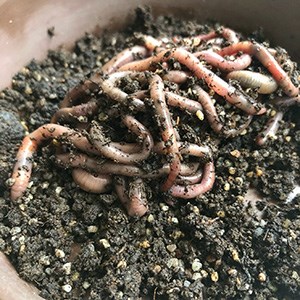Contact
 |
Elsa Arrazola Vasquez |

Heavy machines used in agriculture can make the soil more compact. Researchers at the Department of Soil and Environment can now show that earthworms, which are important for healthy soils and the ability of the soil to deliver ecosystem services, change their behaviour in compacted soils. –We need to consider how soil organisms are affected by agriculture to make sure we have healthy soils in the future, says the PhD Student Elsa Arrazola Vasquez.
Earthworms keep the soil healthy by creating pores which ensure adequate soil aeration as well as drainage. Their bioturbation activity contributes to the cycling of organic matter in the soil, and helps making nutrients available to plants and crops. Earthworms are therefore crucial for the production of nutritious food, the regulation of water, and other ecosystem services that we depend on.
Soils do not have uniform conditions in agricultural fields, for instance there is a variability in soil compaction. Some areas are more loose or more compact than others. Elsa Arrazola Vasquez, PhD student in soil mechanics and soil management, says that there usually are fewer earthworms in compacted areas, which might indicate that the soil conditions are not optimal for earthworms. This might be a serious issue for healthy soil ecosystems. Elsa Arrazola Vasquez and her colleagues decided to study the impact of soil compaction on the behaviour and burrowing activity of the two common earthworm species Aporrectodea caliginosa and Aporrectodea longa.
- Earthworms are involved in many soil processes and are very important for soil functioning. At the same time, they are extremely sensitive to changes in their environment. On a larger scale, non-optimal soil conditions for earthworms means less abundance of earthworms, which can harm soil processes driven by their activity. Compaction should therefore be considered when analysing what factors affect earthworms.
Earthworm species have different roles and behaviour, and are usually classified into three ecological groups. Elsa Arrazola Vasquez and her research team studied two species from different ecological groups. They discovered that at higher compaction levels, there was a significant reduction in burrowing rates for the earthworm species studied. But this negative impact was not the same for both species. One species (Aporrectodea caliginosa) showed a greater decrease in burrowing rates than the other (Aporrectodea longa). The research team could also see that the feeding behaviours of the earthworms changed and that the earthworms might require more energy moving through compacted soil areas.
- The fact that earthworm burrowing activity is hampered by compaction might cause negative effects on soil processes like soil pore creation, cycling of organic matter or water infiltration. This means that some ecosystem services such as soil structure formation, water regulation or nutrient cycling, are being negatively affected.
Whilst soils are a complex and extremely sensitive ecosystem, the management decisions we take can improve or deteriorate their condition, which also determines the presence and behaviour of soil organisms such as earthworms. Elsa Arrazola Vasquez says that the issue is a hot topic right now with regard to the EU Soil Strategy for 2030. The strategy has identified soil compaction and the loss of biodiversity as problems to solve.
-Soil organisms are key to the appropriate functioning of soil ecosystems. There is a need to improve their environment to allow them to thrive, which the EU has addressed in the Soil Strategy by promoting sustainable management practices.
Considering the current climate change scenarios, where soils and soil organisms are under threat, it is essential to start making appropriate changes in the agricultural management decisions to reduce negative impacts as much as possible. One way to reduce the risk of soil compaction and its impacts on earthworms is to use smaller agricultural vehicles or minimizing the areas where heavy machinery is used, according to Elsa Arrazola Vasquez.
 |
Elsa Arrazola Vasquez |